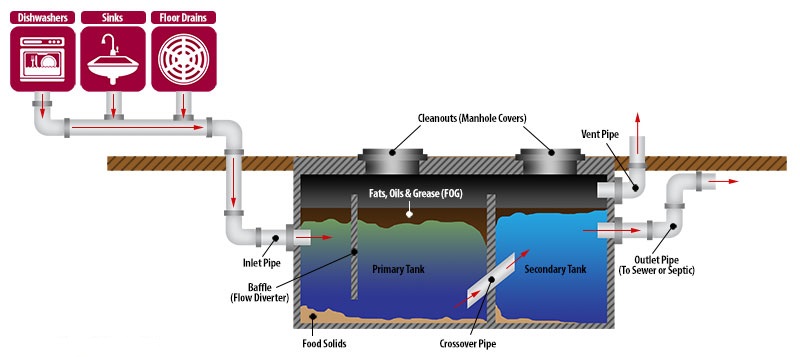
The City is required to have regulations in place for grease traps and interceptors to ensure sanitation measures are correctly enabled for public welfare, to reduce the potential of overflows, and to limit the blockage of fats, oils, and grease. If your establishment has a grease trap or interceptor, it is required to be cleaned no less than once every 90 calendar days unless an approved, written extension is granted by the City.
If your establishment does not currently have a grease trap, please refer to Chapter 34, Article V, Section 34-225; Trap Cleaning Requirements, and Chapter 70, Article III, Section 70-111; Use of the Public Sewers Regulated; Certain Wastes Limited or Prohibited of the City's Ordinance to confirm a device is warranted.
If your establishment contracts with a TCEQ-permitted grease pumping truck, or suction truck, the truck operator should completely evacuate the grease trap and scrape the trap walls to remove particles adhering to the surface.
Per the City's Ordinance, all evacuation manifests or logs should be sent to the City's Public Works Department. These records may be submitted electronically to dcordova@jerseyvillagetx.com and should be accessible to any City Inspector when inspections are performed on the establishment.
Please be aware that enzyme, bacteria, and other treatment methods are strictly prohibited.
Grease Trap 101
A grease trap, or grease interceptor, is a device designed to trap and separate fats, oils, and grease (FOG) and food solids from wastewater. The separated grease and solids are held in the grease trap, allowing the remaining wastewater to pass into the City Sewer System.

Failure to pump out your grease trap can result in:
- Clogging to your establishment's plumbing
- Sewage overflows in your neighborhood
- Damage to the environment
Grease found in the City Sewer System can be traced back to the source and the costs of repairs and clean up can be passed on to the violator.
Best Practices
To operate properly, grease and solids must be removed from the grease trap regularly. This practice prevents the separated F.O.G. and solids from flowing into plumbing and City Sewer lines. The following best management procedures can be used to help prevent excessive build-up:
- Pump your grease trap at least once every 3 months
- Use a permitted liquid waste hauler
- Maintain a copy of the waste manifest for each pump out (keep these records on-site)
- Never use enzymes, chemicals, or similar agents
- Place "No Grease" signs above sinks
- Recycle waste cooking oil using a waste oil bin
- Train and educate staff about the importance of proper grease disposal
For any questions or concerns regarding the City's F.O.G Program, procedures, or inspections, please contact:
Danielle Cordova
Public Works Manager
713-466-2133
dcordova@jerseyvillagetx.com